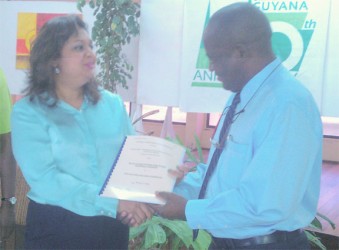The Ministry of Education yesterday presented contracts to the University of Guyana for the execution of works under the World Bank-funded US$10M University of Guyana Science and Technology Support Project.
The contracts were handed over by Education Minister Priya Manickchand to the university’s Vice-Chancellor Jacob Opadeyi to strengthen the four science and technology faculties at the university, which have for long been lagging behind other regional and international universities.
The University of the West Indies Consulting Inc was awarded the Curri-culum Reform contract at a cost of US$499,243 to organise the reform process for 15 bachelor’s degree programmes in the Science and Technology Faculties while an Italian/ Guyanese joint venture— Hydea in association with RPA Rossiprodi and sub-consultant CEMCO— was granted the Civil Works contract at a cost of US$368,014 for the rehabilitation of 14 laboratory buildings in the four science faculties.

The project is expected to be implemented over a five-year period and aims to better prepare graduates for jobs in low carbon industries and build sustainable capacity to operate the university and plan for its future development. The four faculties are: the Faculty of Agriculture and Forestry, the Natural Sciences Faculty, the Technology Faculty and the School of Earth and Environmental Sciences.
The improvement of the quality of science education through curriculum reform and support for research in Low Carbon Development areas, and upgraded physical infrastructure has been cited as the focus of the project.
Opadeyi said it was no secret that the university has been behind in its development of physical infrastructure and its education curriculum. He, however, declared that he was delighted to know that they are working toward transforming the university to a regional and international level.
“So far we have been moving steadfastly in implementing this project… I’m pleased to note that next week we will be handing over contracts to our colleagues to conduct research,” he said. “When you look at the basket of the topic of research that we have done and context of money we have given to them, you will conclude that this university is ready for the future.”
He said consultants will review the university’s staffing structure, conditions of service and how it can improve their relationship with staffers so that it would be a place of choice for everyone.
The consultants are expected to commence work by conducting widespread consultations with stakeholders both internal and external to the university. The curriculum reform consultation will not only include staffers but also the private sector, NGOs, indigenous groups, student groups, community leaders and parents.
A situational analysis report along with recommendations of courses to be revised, updated and re-oriented will be the outcome of consultations. Consultants will then work closely with the faculties to complete the required revision along with accompanying instructional materials. The contract is expected wrap up within 36 months.
“This is a very big contract,” Opadeyi said. He noted that consultants will come from the University of West Indies.
He added that the infrastructural project is also important to the university and they have received full support from colleagues. “We have a lot of work to do…there is a high level of support from all our colleagues we can’t wait for this to happen.”
The rehabilitation of the buildings is expected to include new water and power systems, new lighting, provision of air conditioning, new furniture, new floor surfaces and new cupboards. It will also address basic electrical, water, sewage and roofing for the buildings in which the laboratories are housed and also the “campus-wide” issue of appropriate drainage and pumps to avoid frequent flooding on the campus.
The output of the design phase is to see the construction of documents, inclusive of drawings, bills of quantity and technical specifications. A procurement process will then be initiated for the construction and rehabilitation works.
Opadeyi asserted that the university did not have a space issue but a space utilization issue and therefore it will be analysing how best it can utilise its space. He said there is equipment for virtual classrooms and it is hoped that Tain students can someday attend classes, virtually, at the Turkeyen Campus. He added, extending the programme to support the university’s online degree programmes is also hoped for by the university administration.
He said there were provisions for portable classrooms and offices to be available during the construction stage in the 2014 budget. The budget for the rehabilitation works, which is expected to commence in the third quarter of 2014, is US $4.5M.
“I want to tell the public that this university is ready for business,” he declared.
Manickchand said the projects would accelerate the pace at which students are developed while making them marketable around the world. She also indicated that the government needed to make sure there is a market available for them “when they exit the gates of this university”.
“All of this must happen together if we are to propel Guyana forward in this developmental drive,” she said. “Here, this morning, is a manifestation of the government’s tangible commitment to the University of Guyana. It is a manifestation of our commitment that we will do what we have to do ensure the University of Guyana produces graduates that will be competitive here in Guyana and across the world,” she stated.
She said it was clear that tertiary and higher education institutions play a large role in the development of a country “And so we are absolutely sure if we are to develop rapidly at a pace that Guyana deserves… we will have not only macro-economic growth but also improve the human condition as a whole”.
She stated the government was positive that the university was well poised to play its role in national, human and social development, saying that the government was confident that they will see quality work from the contractors and consultants.





